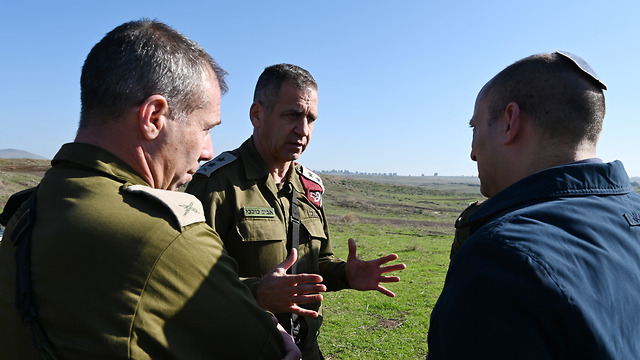Getting your Trinity Audio player ready...
According to Syrian reports, Israel is believed to be behind Sunday night's attack on Iranian targets in Syria. The missile attack apparently targeted arms shipments arriving at the Damascus military airport from Tehran.
After a period of relative calm, Iran has decided to resume the smuggling of high-precision missiles and anti-aircraft missiles - the kind of high-quality weapons known to the Israeli public as "tie-breakers" – and flood Syria with its proxy militias.
The UK-based human rights watchdog, the Syrian Observatory for Human Rights, reported shortly after the strikes that an ambulance was dispatched to the scene, meaning there probably were casualties.
According to later reports in Syrian media, at least three people, probably Iranian nationals, were killed in the attack.
Unverified reports in Syria also say the commander of Revolutionary Guard Corps' Aerospace Force, Amir Ali Hajizadeh, was also hurt in the alleged Israeli attack.
Hajizadeh apparently oversaw the September drone strike on Saudi oil facilities that debilitated half of the Gulf country's fossil fuel industry, and was in charge of shipping state-of-the-art anti-aircraft weapons from Iran into Syria.
In 2018, Hajizadeh oversaw a shipment of anti-aircraft missile batteries to Syria, which was targeted in alleged Israeli raid. Foreign sources reported that seven Iranian officers were killed in the attack.
The Iranians denied the reports the commander was injured.
This is probably true because had Hajizadeh been hurt, the Iranians would have retaliated with exceptional force since in his rank, the commander is second only to Revolutionary Guard chief Qasem Soleimani.
3 View gallery


Aerospace Force of the Islamic Revolutionary Guard Corps Commander Amir Ali Hajizadeh
If it was indeed Israel that attacked near Damascus on Sunday, it signals that the Jewish State will not hesitate to act against any Iranian aggression in the region. The Iranians, meanwhile, also seem to have changed their policy on attacks attributed to the IDF and decided to respond to Israeli strikes even if Israel did not take accountability for them.
The latest developments in the region indicate the Iranians are making preparations to attack Israel, as evidenced by renewed arms shipments not only to Syria but to Lebanon as well.
In Lebanon the Iranians suffered a setback after their weapons production facilities became a target of a mysterious drone attack on a "fuel mixer" in Beirut, which foreign media also attributed to Israel.
In addition, the Iranians are building a military base in the Al Bukamal region near the Syria-Iraq border to establish a land corridor through Syria and Lebanon to the Mediterranean Sea, an effort that top Israeli diplomats and senior security officials have vowed to prevent.
3 View gallery


IDF chief Aviv Kochavi (center) and Defense Minister Naftali Bennett (right) in the Golan Heights
(Photo: GPO)
Israeli actions in Syria are part of the defense establishment calls the "in-between wars" campaign, meant to prevent Iran from establishing its military presence in Syria and to allow the Israeli Air Force freedom of action in case an all-out war breaks out.
Therefore, as Iran resumes its efforts to entrench itself in Syria, the activity attributed to Israel is also expected to increase in the near future.
Over the recent weeks, the Russians have put enormous pressure on the Iranians to stop operating in Damascus International Airport and redirect its cargo flights to other airports in Syria, mainly the T-4 Airbase near the city of Homs. These flights also served as a way to transfer fighters of Iranian-backed militias to the Idlib region southeast of Aleppo.
Since these flights did not impose any danger to Israel, the army avoided attacking on Syrian soil.
However, given the increased Iranian activity near Israeli border, the military has appealed to the Russians regarding the Iranian violations and pointed out precise geographical locations where arms and personnel are transferred.
It is likely that as part of the de-confliction agreements, Israel had notified Russia about the attack a few minutes in advance.
We will probably see further Iranian attempts to establish a front in Syria and revive its precision-missile project. Israel, however, won't stand and watch from the side.


